新概念英语第二册Unit单元测试.docx
新概念英语第二册课后习题答案详解和单元测试答案(全)
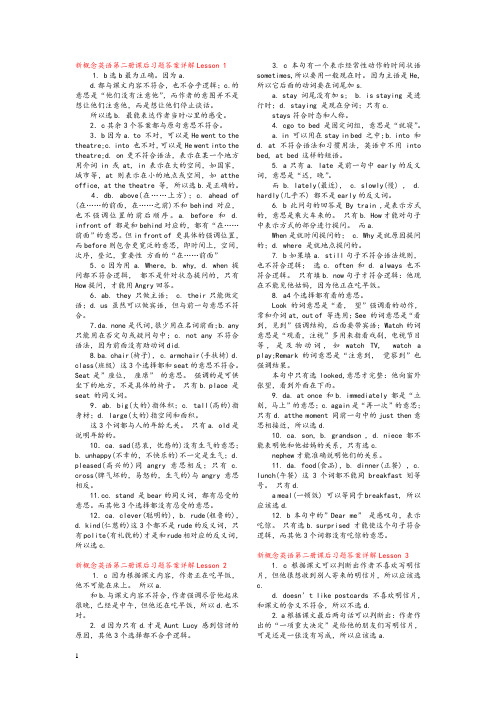
新概念英语第二册课后习题答案详解Lesson 11. b选b最为正确。
因为a.d.都与课文内容不符合,也不合乎逻辑;c.的意思是“他们没有注意他”,而作者的意图并不是想让他们注意他,而是想让他们停止谈话。
所以选b. 最能表达作者当时心里的感受。
2.c其余3个答案都与原句意思不符合。
3.b因为a. to 不对,可以是He went to the theatre;c. into 也不对,可以是He went into the theatre;d. on更不符合语法,表示在某一个地方用介词in 或at, in 表示在大的空间,如国家,城市等,at 则表示在小的地点或空间,如atthe office, at the theatre 等, 所以选b.是正确的。
4.db. above(在……上方);c. ahead of (在……的前面,在……之前)不和behind 对应,也不强调位置的前后顺序。
a. before 和 d. infront of 都是和behind对应的,都有“在……前面”的意思。
但in front of 更具体的强调位置,而before则包含更宽泛的意思,即时间上,空间,次序,登记,重要性方面的“在……前面”5.c因为用 a. Where, b. why, d. when 提问都不符合逻辑,都不是针对状态提问的,只有How提问,才能用Angry回答。
6.ab. they 只做主语; c. their只能做定语;d. us 虽然可以做宾语,但与前一句意思不符合。
7.da. none是代词,很少用在名词前面;b. any 只能用在否定句或疑问句中;c. not any 不符合语法,因为前面没有助动词did.8.ba. chair(椅子), c. armchair(手扶椅) d. class(班级) 这3个选择都和seat的意思不符合。
Seat是”座位,座席”的意思。
强调的是可供坐下的地方,不是具体的椅子。
新概念英语第二册U1第一单元测试(带答案)
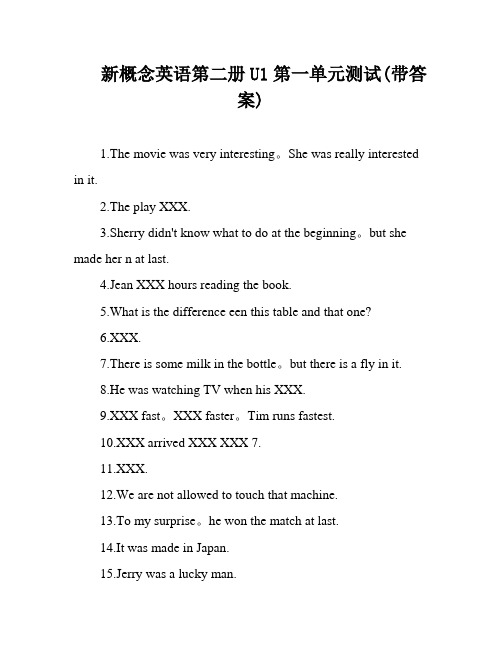
新概念英语第二册U1第一单元测试(带答案)1.The movie was very interesting。
She was really interested in it.2.The play XXX.3.Sherry didn't know what to do at the beginning。
but she made her n at last.4.Jean XXX hours reading the book.5.What is the difference een this table and that one?6.XXX.7.There is some milk in the bottle。
but there is a fly in it.8.He was watching TV when his XXX.9.XXX fast。
XXX faster。
Tim runs fastest.10.XXX arrived XXX XXX 7.11.XXX.12.We are not allowed to touch that machine.13.To my surprise。
he won the match at last.14.It was made in Japan.15.Jerry was a lucky man.16.Please don’t call me at 9:30 tomorrow morning。
I will be XXX.17.If you read the book tomorrow。
you will be very happy.18.She could read fifty poems when she was only five.19.XXX.20.XXX。
10.6月7日早上,XXX抵达了伦敦机场。
11.不要嘲笑别人的错误。
12.我们不允许触摸那台机器。
13.令我惊讶的是,他最终赢得了比赛。
新概念II 第二单元测试卷(有答案)Test for Unit 2 in New Concept English II
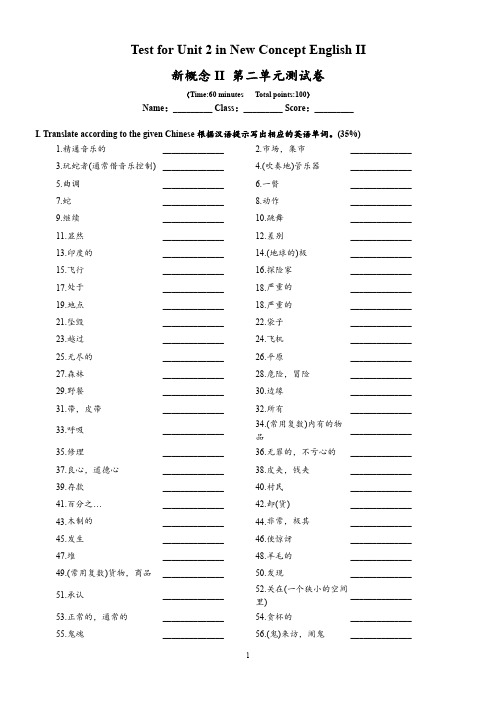
Test for Unit2in New Concept English II新概念II第二单元测试卷(Time:60minutes Total points:100)Name:_________Class:_________Score:_________I.Translate according to the given Chinese根据汉语提示写出相应的英语单词。
(35%)1.精通音乐的______________2.市场,集市______________3.玩蛇者(通常借音乐控制)______________4.(吹奏地)管乐器______________5.曲调______________6.一瞥______________7.蛇______________8.动作______________9.继续______________10.跳舞______________11.显然______________12.差别______________13.印度的______________14.(地球的)极______________15.飞行______________16.探险家______________17.处于______________18.严重的______________19.地点______________18.严重的______________21.坠毁______________22.袋子______________23.越过______________24.飞机______________25.无尽的______________26.平原______________27.森林______________28.危险,冒险______________29.野餐______________30.边缘______________31.带,皮带______________32.所有______________33.呼吸______________34.(常用复数)内有的物品______________35.修理______________36.无罪的,不亏心的______________ 37.良心,道德心______________38.皮夹,钱夹______________ 39.存款______________40.村民______________ 41.百分之…______________42.卸(货)______________ 43.木制的______________44.非常,极其______________ 45.发生______________46.使惊讶______________ 47.堆______________48.羊毛的______________ 49.(常用复数)货物,商品______________50.发现______________51.承认______________52.关在(一个狭小的空间里)______________53.正常的,通常的______________54.贪杯的______________ 55.鬼魂______________56.(鬼)来访,闹鬼______________57.堵______________58.家具______________59.威士忌酒______________60.暗示______________61.摇动______________62.接受______________63.拔______________64.药棉______________65.搜集______________66.收藏品,收集品______________67.点头______________68.同时______________II.Choose the best answer.(15%)()1.I nodded.This means I_____.A.agreedB.said noC.shoutedD.whispered()2.He asked me how my brother was.“How______?”he asked.A.is your brotherB.your brother wasC.your brother isD.was your brother ()3.He heard a noise_____coming from the bar.A.which wasB.who wasC.that isD.which is()4.Mr.Ian Thompson_____a public house a short time ago.A.has boughtB.boughtC.was boughtD.is bought()5.Workers began_____a number of wooden boxes.A.unloadB.to unloadingC.unloadedD.unloading()6.What did he find?He was surprised at what_____.A.did he findB.he did findC.he foundD.he has found ()7.The wallet was found_____one of the villagers.A.fromB.byC.out ofD.of()8._____had it been wrapped up in?A newspaper.A.WhereB.WhoC.HowD.What()9.They didn’t steal anything.They stole_____.A.anythingB.not anythingC.not nothingD.nothing()10.He would be able to reach the Pole_____was300miles away.A.whichB.whoC.itD.which it()11.The writer couldn’t speak because_____.A.the dentist had just pulled one of his teeth outB.the dentist was talking all the timeC.there was something in his mouthD.he had a toothache()12.Mr.Thompson wants to sell his pub because_____.A.he heard a strange noise coming from the barB.he found the doors had been blocked by chairsC.he found five empty whisky bottlesD.he thinks it’s visited by a ghost()13.The man had hidden in the box_____.A.to get to SydneyB.because it contained woolen goodsC.to avoid paying the fare from London to SydneyD.because no one would find him()14.The snake probably‘danced’_____.A.by listening to the Indian musicB.by listening to the jazzC.by looking at the snake charmerD.by following the movements of the snake charmer’s pipe()15.The writer was sorry he made rude remarks because_____.A.his wife reminded him that he had bought a terrible tieB.he has a lot of tiesC.his wife has a lot of hatsD.his wife got annoyed with himIII.Words often confused.Choose the correct words in the following sentences.Underline the better one(10%)1.He borrows money from people(continuously)(continually).2.The crowd cheered as the soldiers marched(past)(passed)3.On the first day all went well.But on the(next)(other)day there was a storm.4.I am looking for a new(work)(job).5.He is a very(experience)(experienced)doctor.6.The government is trying to persuade people to(economize)(save)money.7.It was(such)(so)a good book that it was bought by a film company.8.He ran(such)(so)quickly that I could not catch him.9.Do you(deny)(refuse)that you have told me a lie?10.The ball went over the fence and the football player asked a boy to(fetch)(bring)it.e the joining words in parentheses.(10%)1.I had made a mistake.I had criticized his work.(not only…but…as well)__________________________________________________2.The villagers ran away in fear.They never came back again.(and)___________________________________________________3.Woolen goods cannot be eaten.At least they are soft.The man had had a few hours’sleep.(but…so)___________________________________________________4.He paid back the money.He bought himself a clear conscience.(not only…but also)___________________________________________________5.Thieves can be very daring.They can be very timid.(either…or)___________________________________________________V.Verbs followed by to,at,for and with.(10%)1.I knock_______the door.at2.Whom does this book belong_______?to3.please don’t mention it_______my husband,but I paid$50_______this hat.to…for4.I don’t agree_______you.with5.She preferred_______wait______him.to…for6.We have been corresponding______each other for years.with7.How do you a account______this?for8.Do you object______my smoking?to9.I’m surprised______you!at10.You must reply______his letter.withVI.Give the correct form of the verbs in parentheses.(10%)1.I’d love_________(see)that film.Will it be on tomorrow?2.He’s accustomed to_________(work)very hard.3.These shirts need________(iron).4.I hate________(leave)so early,but I’m afraid I have to.5.They continued_________(argue)till after midnight.6.Would you like_________(come)with me?7.I shall be looking forward to_________(see)you soon.8.You must never come into this room without__________(knock)first.9.I got tired of_________(wait)so I left.10.I don’t believe in________(work)too hard.VII.Translate the sentences.(10%)1.我现在是一个100%诚实的人了!____________________________________________________________________________________.2.萨姆确信那钱包一定是被某个村民捡到了,课时却不见有人来送还给他。
新概念英语第二册课后习题答案详解and单元测试答案(全)
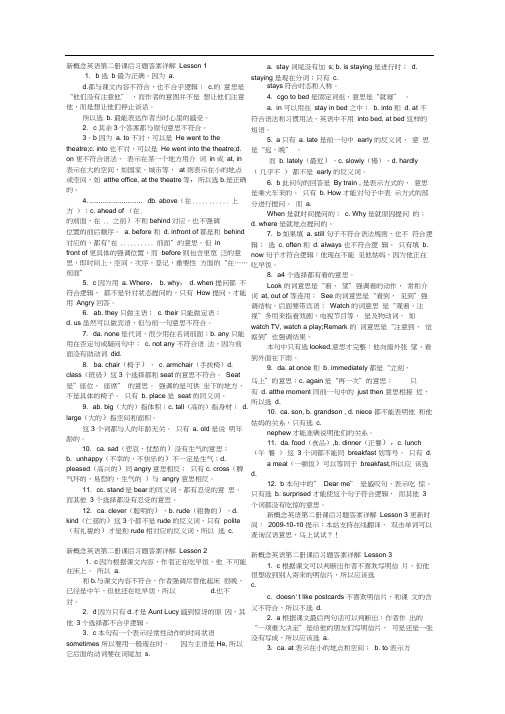
新概念英语第二册课后习题答案详解Lesson 11. b 选b 最为正确。
因为a.d.都与课文内容不符合,也不合乎逻辑;c.的意思是“他们没有注意他” ,而作者的意图并不是想让他们注意他,而是想让他们停止谈话。
所以选 b. 最能表达作者当时心里的感受。
2. c其余3个答案都与原句意思不符合。
3.b 因为a. to 不对,可以是He went to the theatre;c. into 也不对,可以是He went into the theatre;d. on 更不符合语法,表示在某一个地方用介词in 或at, in 表示在大的空间,如国家,城市等,at 则表示在小的地点或空间,如atthe office, at the theatre等,所以选b.是正确的。
4. ............................ db. above(在........... 上方);c. ahead of (在.的前面,在.. 之前)不和behind对应,也不强调位置的前后顺序。
a. before 和 d. infront of 都是和behind 对应的,都有"在.......... 前面”的意思。
但infront of 更具体的强调位置,而before 则包含更宽泛的意思,即时间上,空间,次序,登记,重要性方面的“在……前面”5. c 因为用a. Where, b. why, d. when 提问都不符合逻辑,都不是针对状态提问的,只有How 提问,才能用Angry 回答。
6. ab. they 只做主语;c. their 只能做定语;d. us 虽然可以做宾语,但与前一句意思不符合。
7. da. none是代词,很少用在名词前面;b. any 只能用在否定句或疑问句中; c. not any 不符合语法,因为前面没有助动词did.8. ba. chair(椅子),c. armchair(手扶椅)d. class(班级)这3个选择都和seat的意思不符合。
新概念二册第二单元考试题2

新概念英语第二册第二单元测试一、单项选择。
10分1、It’s not polite to speak in public.A. loudB. loudlyC. louder2、Your bike is my sister’s.A. same asB. as the sameC. the same as3、I’m in any book.A. interested; interestingB. interesting; interestedC. interests; interest4、He asked his father .A. where it happensB. what was happenC. how it happened5、I don’t know he will come tomorrow, he come, I will tell you.A. if; whetherB. whether; whetherC. whether; if6、——will you stay in America?——About two months.A. How manyB. How oftenC. How long7、He found very interesting to ride a horse on the farm.A. thisB. thatC. it8、If he______ out, I would call you to come with me.A. isB. wasC. were9、His parents make her at night.A. stay at homeB. stags at homeC. to stay at home10、Which do you like , Jeans or cheongsam?A. goodB. betterC. well二、根据句意,用括号中所给词的正确形式填空。
新概念英语第二册U1第一单元测试(带答案)
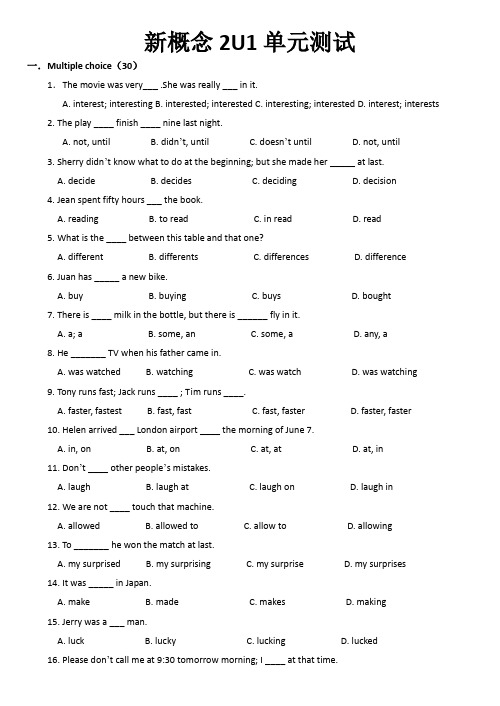
新概念2U1单元测试一.Multiple choice(30)1.The movie was very___ .She was really ___ in it.A. interest; interestingB. interested; interestedC. interesting; interestedD. interest; interests2. The play ____ finish ____ nine last night.A. not, untilB. didn’t, untilC. doesn’t untilD. not, until3. Sherry didn’t know what to do at the beginning; but she made her _____ at last.A. decideB. decidesC. decidingD. decision4. Jean spent fifty hours ___ the book.A. readingB. to readC. in readD. read5. What is the ____ between this table and that one?A. differentB. differentsC. differencesD. difference6. Juan has _____ a new bike.A. buyB. buyingC. buysD. bought7. There is ____ milk in the bottle, but there is ______ fly in it.A. a; aB. some, anC. some, aD. any, a8. He _______ TV when his father came in.A. was watchedB. watchingC. was watchD. was watching9. Tony runs fast; Jack runs ____ ; Tim runs ____.A. faster, fastestB. fast, fastC. fast, fasterD. faster, faster10. Helen arrived ___ London airport ____ the morning of June 7.A. in, onB. at, onC. at, atD. at, in11. Don’t ____ other people’s mistakes.A. laughB. laugh atC. laugh onD. laugh in12. We are not ____ touch that machine.A. allowedB. allowed toC. allow toD. allowing13. To _______ he won the match at last.A. my surprisedB. my surprisingC. my surpriseD. my surprises14. It was _____ in Japan.A. makeB. madeC. makesD. making15. Jerry was a ___ man.A. luckB. luckyC. luckingD. lucked16. Please don’t call me at 9:30 tomorrow morning; I ____ at that time.A. will be have a meetingB. will be has a meetingC. will have a meetD. will be having a meeting17. If you ____ the book tomorrow, you will be very happy.A. will readB. will readingC. will be readingD. read18. She ____ read fifty poems when she was only five.A. canB. couldC. mayD. must19.She ___ last year.A. give up smokingB. give up smokeC. gave up smokingD. give up smoking20. My mother has to Hong Kong twice.A. comeB. gotC. goneD. been21. I did not remember her before.A. have metB. having metC. to having metD. to meet22. I’ll go with you to the theater as soon as I my homework.A. will finishB. shall finishC. finishD. finished23. —Has your neighbour moved into the new house?—Not yet. The house _____.A. being builtB. is being builtC. is buildingD. is built24. It ____ be my son. He has gone to America.A. mustB. mustn’tC. canD. can’t25. The cake is made _____ flour, butter, eggs and sugar.A. ofB. fromC. byD. in26. The flowers are dead. I _____ more water.A. will giveB. should have givenC. must giveD. would have given27. He told me that he _____ to Paris for two months.A. has goneB. had goneC. has beenD. had been28. I disliked them so I bought _____ them.A. neither ofB. neitherC. both ofD. both29. —I’m sorry sir. The tickets have been sold out. —_____A. What a pity!B. Certainly.C. May I have two tickets?D. You’re welcome.30. Tomorrow is my mother’s birthday? I’ll buy her ___.A. something specialB. anything specialC. special somethingD. special anything二.Fill in the blanks with proper prepositions(5)1. I’ll go out for a walk _____ half an hour.2. He’s lived in the small house _____ 30 years.3. Look _____! The tiger is dangerous.4. Last week I went to my hometown _____ train.5. I met my English teacher ___ the way home yesterday.三.Choose correct word to fill in the blanks(20)enjoy spent salary waste appear polite afford lift proud famous1. It is a w_________ of time to do that kind of thing.2. She s ________ ___ five days on the work.3. We waited and waited, but the little mouse didn’t a________.4. Hugh didn’t e___ __ watching that film.5. John works in a foreign company but he doesn’t get a good s________.6. Chong qing is f______ for its hot pot.7. When he was driving along the mountain road, a boy asked him for a l__ __.8. The house is so expensive that Sherry can’t a_____ it.9. Sharon is a p__ ____ girl. She always smiles when she speaks to others.10. The boy’s parents are p________ of him; he always studies hard .四. Cloze (15)Mr. White works in an office. He liked 1 in bed when he was at school. It was bad for his eyes and now he has near sight. But he wouldn't like anybody else to know about _2 _and he never wears a pair of glasses, and it often _3 _ him some trouble.One winter morning he was sent to a village school on business. He _4_ the bus at a stop in a small town. Then he had to _5 _ there. The road to the village wasn't smooth(平坦). He fell over some times and it made his clothes dirty. When he_6 _ got to the village, it began to blow and it got _7 _. He was looking for the school while his _8 _was blown off. He began to run after it but he couldn't get it. He couldn't understand why his hat ran into a house as if it had __9__. And he ran into the house, too.A woman stopped him and shouted angrily, "_10 _are you running after my hen for?"Choose the best answer according to the passage1. A. reading B. dancing C. singing D. writing2. A. these B those C. them D. it3. A. follows B takes C. brings D. carries4. A. took off B got off C. got on D. come on5. A. ride B drive C. walk D. fly6. A. at first B .at home C. at times D. at last7. A. hotter B. warmer C. colder D .cooler8. A. clothes B. bag C. hat D. glasses9. A. legs B. hands C. shoes D. arms10. A. What B. Why C. Which D. Who五Readings(30)(1)One day a big rock fell down from a mountain. The rock stopped in the middle of the road in a village. It was like a big ball. Some of the strongest men in the village tried to move the rock. But no matter how hard they tried, they couldn't move it away. They tried to push it; they tried to roll it and they tried to pull it with a rope, but nothing worked."Well" they agreed, "there's nothing we can do about it. We'll have to build another road. "At this time, a young boy of about 12 years old said, "Excuse me, sirs, but I think I can help you move the rock. ""You?" they shouted, "What are you talking about? All of us have just tried and we can't move it at all.”The men all laughed at the boy.The next morning some people came into the street. One of them shouted, "The rock is gone!" More people ran out into the street to see for themselves. It was true, and no one could see it anywhere."It is impossible, where has it gone?" they said. The boy stood out, saying "I did it last night. I dug a deep hole next to the rock and the rock rolled down into the hole by itself. Then I covered it with earth. "1. Where was the big rock from?A. a streetB. a mountainC. a hillD. a tree2. Why did the people in the village want to move the rock away? Because_______.A. it was in the middle of the roadB. it was on the mountainC. they didn't like the rockD. they wanted to build a road3. What did the people decide to do when they were not able to move the rock away?They decided to_______A. find someone stronger to help themB. ask a little boy of 12 to help themC. build another roadD. break the rock4. Why did the people laugh at the boy? They thought that___.A the boy was too weak to move the rock awayB the boy was so strong that he could move the rockC. the boy was very helpfulD. it was easy for him to move the rock5. The next morning the people in the village found the rock ____A. disappearedB. was still thereC. was back on the mountain againD. was rolling down from the mountain(2)Some ants make their homes under a stone. If the weather is warm, you may see many ants under the stone. If the weather is cold, many ants will be in their house under the ground.Most of the ants are workers. They are very busy. They look for food and take care of the young ants. Each family of ants has a queen ant. The queen ant doesn't work. She is important because she lays eggs. Those eggs will become baby ants.There are many kinds of ants in America. One kind of these is very strong. People are afraid of it, and animals are afraid of it, too.These ants move in groups. They eat all the animals on their way. They can kill and eat elephants, and they can eat wooden houses. When the ants come near, people leave their homes. But people are sometimes glad after the ants pass through, because they will see no other insects or snakes.1. Where can you find ants on warm days?A. Under the ground.B. On the ground.C. Inside people's houses.D. Under a stone.2. Why is a queen ant more important than a worker ant? Because ___A. a queen ant produces the youngB. a queen ant is stronger than all the other family membersC. a queen ant finds food for all the other family membersD. a queen ant does more work than all the other family members3. Where can you find many kinds of ants according to the passage?A. In America.B. In China.C. In Canada.D. In Britain.4. Why are people glad after the dangerous ants pass through?A. Because they are goneB. Because they are not dangerous any moreC. Because there are no other insects or snakesD. Because the ants can be eaten5. Which of the following is true?A. People are not afraid of any kind of ant.B. Big animals are not afraid of any kind of ant.C. An elephant can kill and eat a kind of very strong ant.D. One kind of ants moves in groups.(3)Tom Green spent his 114th birthday the other day and some reporters visited him to find out the secret of a long life.“The secret of a long life is happiness,” Green said. “If you are happy, you will live a long time.”“Are you married?” a reporter asked. “Yes,” Green answered. “I married my third wife when I was 102. If you are happily married, you will live better. But for my third wife, I would have died years ago.”“What about smoking and drinking?” another reporter asked. “Yes, they are important,” Green said. “Don’t smoke at all and you will feel well. Drink two glasses of wine a day and you will be healthy and happy. ”1.Some reporters visited Green because ____________A. he did something peculiarB. he was a friend of themC. he had lived much longer than most peopleD. he had married three times2. Green thought that _____ was the most important to life.A. his third wifeB. gladC. happinessD. smoking3.Green thought his third wife helped him to live _____ years longer.A.12B.14C.16D.184. The writer wants to tell us_______A. drinking a great deal is good for our healthB. drinking within a limit is helpfulC. smoking and drinking are indispensable to good healthD. we should quit smoking or drinking.5. The best title for this passage is_____.A. Drinking and SmokingB. The Secret of a Long LifeC. Happiness in LifeD. Astonished Reporters参考答案一.1-30 CBDAD DCDAB BBCBB DDBCD BCBDB BBAAA 二.1. in 2. for 3. out 4. by 5. on三.1. waste 2. spent 3. appear 4. enjoy 5. salary6.famous7. lift8. afford9. polite 10. proud四.1-10ADCBC DCCAA五.1. BACAA 2.DAACD 3. CCABB。
新概念英语第二册第二单元答案
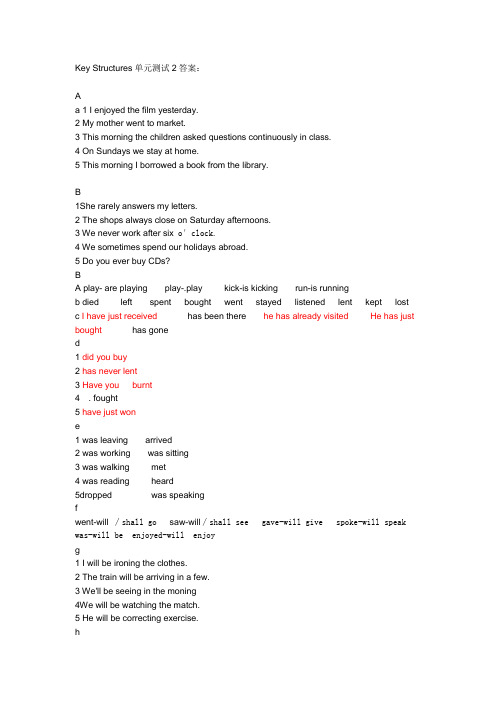
Key Structures单元测试2答案:Aa 1 I enjoyed the film yesterday.2 My mother went to market.3 This morning the children asked questions continuously in class.4 On Sundays we stay at home.5 This morning I borrowed a book from the library.B1She rarely answers my letters.2 The shops always close on Saturday afternoons.3 We never work after six o′clock.4 We sometimes spend our holidays abroad.5 Do you ever buy CDs?BA play- are playing play-.play kick-is kicking run-is runningb died left spent bought went stayed listened lent kept lostc I have just received has been there he has already visited He has just bought has goned1 did you buy2 has never lent3 Have you burnt4 . fought5 have just wone1 was leaving arrived2 was working was sitting3 was walking met4 was reading heard5dropped was speakingfwent-will∕shall go saw-will∕shall see gave-will give spoke-will speak was-will be enjoyed-will enjoyg1 I will be ironing the clothes.2 The train will be arriving in a few.3 We'll be seeing in the moning4We will be watching the match.5 He will be correcting exercise.h1 After she wrote the letter she went to the post office.2 After he had dinner he went to the cinema.3 When I had fastened my seat belt the plane took off.4 We did not disturb him until he finished work.5 As soon as he had left the room I turned on the radio.iwas built became/had become died was built were called was begun completed cost has been visitedj1 told would come2 said had cut3 told had4 did say had done5 did tell had boughtk1 rains2 will pass3 is4 will get5 enjoysLFishing catching catching having spent fishing fishing sittingdoingCa 1 You must see a doctor.2 Do you have to make so much noise?3 she said we must stay here.4 I have to some help.5 He had to go out last night.b1 He must be a fool.2 He must be mad.3 She must be over forty.C1 May I use your telephone?2 He may telephone tomorrow.3 Can/May I have two tickets please?4 The play may have begun already.5 Can/May I leave the table please?Da 略ba. \ a a a the \ a the the a a \ the a a a E1 the most unusual2 better than3 more interesting than4 the laziest5 worse thanF1 in2 On3 during/in4 at5 on in6 in7 at inG1 in2 from3 on4 of5 in6 ofSpecial difficultiesA1 By the way2 borrowed3 ask4 grown5 Besides6 its7 yet8 desk9 It is10 homeB1 at2 up3 on4 out back5 outc1 Who knocked this vase over?3 Put your jacket on.5 The thieves woke the night watchman upD1. the men to fire at the enemy.2. his wife to wear this dress.3. us to explain it.4 . him to enter the room.5 . her son to read.e1 She made me this dress.2 I lent him my book.3 I showed George the letter.4 Pass your mother that cup.5 Johnny gave his sister the doll.红体字的题目少印了单词,把它加上去。
新概念英语第二册 第一单元 测试题

新概念英语第二册第一单元测试题(满分150分)姓名分数一、英汉互译(30×1’)1. private2. conversation3. repeat4. museum5. decision6. public7.distance 8.valuable 9. expect10. competition 11.beggar 12.performance13. 聚集14.乐器15.经理16. 允许17.抱怨18.立刻19. 场合20. 经历21.扔、抛22. 打断23.发疯24. 服从25. 舞台26抓到27. 账单28匆忙29返回/归还30负担得起二.单项选择题(20×1. 5’)1. —— _______ terrible weather it is!—— It is said that it will get ______ later.A. What; badB. What ;worseC. How; badD. How; worse2. The book ______ Lucy’s. Look! Her name is on the book cover.A. must beB. can beC. can’t beD. mustn’t be3. It ______ me two hours to get there by bus. A. spent B. took C. used D. paid4. My mother has to Hong Kong twice. A. come B. got C. gone D. been5. Three months quite a long time. A. is B. be C. are D. am6. I did not remember her before.A. have metB. having metC. to having metD. to meet7. I’ll go with you to the theater as soon as I my homework.A. will finishB. shall finishC. finishD. finished8. —Can you deal with the problem?—_____. A. I’m afraid not B. I’m not afraid C. I’m no sure D. I’m sure not 9. —Has your neighbour moved into the new house?—Not yet. The house _____.A. being builtB. is being builtC. is buildingD.is built10. It _____ be my son. He has gone to America. A. must B. mustn’t C. can D. can’t11.The cake is made _____ flour, butter, eggs and sugar. A. of B. from C. by D. in12. There _____ a French film in this cinema next Friday.A. is going to beB. is going to haveC. will haveD. puts on13. Not only you but also I _____ interested the book. A. am B. are C. is D. were14. He told me that he _____ to Paris for two months.A. has goneB. had goneC. has beenD. had been15. I disliked them so I bought _____ them. A. neither of B. neither C. both of D. both16. Yesterday the teacher told us that the earth _____ around the sun.A. was movingB. is movingC. movedD. moves17. —I’m sorry sir. The tickets have been sold out. —___A. What a pity!B. Certainly.C. May I have two tickets?D. You’re welcome.18. When he was walking along King Street, he saw two thieves ___ out of a shop.A. to runB. runC. ranD. running19. T omorrow is my mother’s birthday。
- 1、下载文档前请自行甄别文档内容的完整性,平台不提供额外的编辑、内容补充、找答案等附加服务。
- 2、"仅部分预览"的文档,不可在线预览部分如存在完整性等问题,可反馈申请退款(可完整预览的文档不适用该条件!)。
- 3、如文档侵犯您的权益,请联系客服反馈,我们会尽快为您处理(人工客服工作时间:9:00-18:30)。
新概念英语 2第 1 单元 PRE-UNIT TEST 1A1.He is busy.2.He is learning English.3.He has a new book.4.He lives in the country.5.He will see you tomorrow.6.He can understand you.7.He must write a letter.8.He may come next week.9.He does a lot of work every day.10.He did a lot of work yesterday.11.He played football yesterday.12.He bought a new coat last week.13.He has had a letter from Tom.14.He was busy this morning.15.He could play football very well when he was younger.16.He always tries to get up early.17.He might see you next week.18.He always enjoys a good film.19.He had finished his work before you came.20.He watches television every night.B1. some2. a3. any4. any5. a6. some7. a8. any9. any10. anyC1.I haven't got much butter.2.You haven't got many cigarettes.3.We haven't got much milk.4.She hasn't got many biscuits.5.They haven't got much stationery.D1. bought2. aired3. lost4. listened5. emptied1.Q. Did he buy a new car?Q. What did he buy?2.Q. Can she come tomorrow?Q. When can she come?N. She can't come tomorrow. 3.Q. Were they here yesterday?Q. When were they here?N. They weren't here yesterday.4.Q. Must he leave early?Q.Why must he leave early?N.He mustn't leave early.5.Q. Did he give you a pen?Q.What did he give you?6.Q. Does he live next door?Q. Where does he live?N. He doesn't live next door.7.Q. Do you know him well?Q. How well do you know him?8.Q. Has he found his pen?Q. What has he found?9.Q. Did you see that film?Q. When did you see that film?10.Q. Did he arrive at two o'clock?Q. When did he arrive?N. He didn't arrive at two o'clock.1. slowly2. lazily3. badly4. carefully5. suddenlyG1. He'll...2. She'll...3. I'll...4. He won't ...5. We shan't... H1.his2. mine3. hers4. theirs5. yoursI1. cooler2. Wetter3. Later4. Easier5. More expensive6. larger7. more interesting8. Prettier9. more beautiful 10. more intelligentJ1. yesterday2. tomorrow3. today4. this afternoon5. the day after tomorrow6. the day before yesterday7. last night8. tomorrow morning9. this morning10.yesterday afternoonK1. at2. On3. In4. In5. onL1. over2. under3. across/in4. along5.on6. in7. off8. between9. into10. out ofM1. Which2.Who3.Which4.Who5.WhichN1.This is the car which the mechanic repaired yesterday.2.He is the man whom I invited to the party.3.These are the things which I bought yesterday.4.He is the man who came here last week.5.He is the policeman who caught the thieves.6.She is the nurse who looked after me.7.She is the woman whom I met yesterday.8.I am the person who wrote to you.9.They are the people whom I saw yesterday.10.They are the trees which we cut down yesterday.1. knives2. boxes3. shelves4. wives5. dishesP1.No, I didn't. I took her to a party.2.Yes, I did.3.She sat near the window.4.A middle-aged lady (came into our compartment).5.She was middle-aged.6.She sat opposite Sally.7.She said "Hello" to Sally.8.To make herself beautiful. (She did it to make herself beautiful.)9.No, she didn't. She thought she was ugly.10.She said, "But you are still ugly."(She said she was still ugly.)第 2 单元 PRE-UNIT TEST 2Aa1.I enjoyed the film yesterday.2.My mother went to market.3.(This morning) the children asked questions continuously in class.4.(On Sundays) we stay at home.5.(This morning) I borrowed a book from the library.b1. She rarely...2. The shops always...3. We never...4. We sometimes...5. Do you ever...(后面直接照抄 )Ba...are playing/...play/...is kicking/...is runningb...died/...left/...spent/...bought/...went...stayed/...listened/...l ent/...kept/...lostc...received/...has been/...visited/...bought/...has goned1. ...did...buy...2. ...has never lent...3. Have you burnt...4. ...fought...5. ...have just won...e1. was leaving/left...arrived2. was working/worked...was sitting/sat3. was walking/walked...met4. was reading...heard5. dropped fwent: will/shall go saw: will/shall see gave: will givespoke: will speak was: will be enjoyed: will enjoyg1. shall be ironing2. will be arriving3. We'll be seeing4. shall be watching5. will be correcting1.After she had written the letters, she went to the post office.2.After he had had dinner, he went to the cinema.3.I had fastened my seat belt when the plane took off.4.We did not disturb him until he had finished work.5.As soon as he had left the room, I turned on the radio.i...was built/...became/had become/...died/...was built...were called...was begun/...(was)completed/...cost/...has been visited...j1.told...would come/would be coming2.said...(had) cut3.told...had never played4.did he say...had done/would do5.did he tell...(had) bought/would buyk1. rains2. will never pass3. is4. will get5. enjoysl...fishing/...fishing/...sitting/...doingCa1.You must/will have to see a doctor.2.Must you/Do you have to make so much noise?3.She said we must/would have to/had to stay here.4.I must/have to some help.5.He had to go out last night.b1. He must be a fool.2. He must be mad.3. She must be over forty. c1. Can/May I use your telephone?2. He may telephone tomorrow.3.Can/May I have two tickets please?4. The play may have begun already.5.Can/May I leave the table please?asome soap/a picture/some milk/some money/a woman/a window/a bussome sand/some rice/a\some newspaper/some water/a cloud/a son some coal/a secretary/some oilb略,代表不需要...a/ 略/...a/...a/...a/...the/略/...a/...the/...the/...a/...a/略./...the/...a/...a/...aE1. the most unusual2. better...than3. more interesting than4. the laziest5. worse thanF1. in2. On3. during/in4. At5. on...in6. In7. at...inG1. in2. from3. on4. of5. in6. ofSpecial difficultiesA1. by the way2. borrowed3. ask4. grown5. besides6. its7. yet8. desk9. it is10. homeB1. at2. up3. on4. ...out...back5. outC1.Who knocked this vase over?3.Put your jacket on5.The thieves woke the night watchman upD1....the men to fire at the enemy.2....his wife to wear this dress.3. to explain it.4. ...allow him to enter the room.5. ...her son to read.E1.She made me this dress.2. I lent him my book.3.I showed George the letter.4. Pass your mother that cup.5.Johnny gave his sister the doll.第 3 单元 PRE-UNIT TEST 3A1.He read the book and returned it to the library.2.The boy climbed the tree and picked some apples.3.I opened the door and he came into the hall.4.He looked for his pen, but (he) could not find it.5.She called to him, but he did not answer her.6.Everyone was out, so I left a message.7.He plays both soccer and rugby.8.Both children and adults enjoy holidays.9.He must be either clever or foolish.10.Neither George nor Dave plays football.11.George plays neither soccer nor rugby.12.He neither knows nor cares.13.He not only forgot to take his umbrella but he forgotto take his briefcase as well.Babelieve/are joking/don't know/know/believe/forgetlooked/are trying/believe/think/ live/don't knowbput/cooked/smelled(smelt)/told/sang/began/felt/put/creptchas begun/was/flew/has flown/landed/landedhas just refused/wanted/ didn't take/wasdtold/used to work/was/used to work/saved/bought/used to make/had employed/smiled/remembered/was still smiling/opened/came/wanted e1.We are going to leave at six o'clock.2.I am going to pay these bills tomorrow.3.Are you going to write to him?4.She is not going to look for a new job.5.When are you going to buy a new car?will be held/will visit/will(is going to)build/will also build/will be held will be called/will have completed/will have finished gfound/had run/pent/took/saw/burst/said/had never runhwas asked/was wanted/was told/was pickedwas sent/be found/was stoleni1.He said that he was very tired.2.She asked if you were tired.3.Tom asked if Jack would arrive the next day.4.Tom asked when Jack would arrive.5.Catherine asked if you had ever been abroad.6.Jane asked why you hadn't written to her.j1. is2. don't hurry3. would enjoy4. werek1. to see2. ironing3. leaving4. arguing/to argue5. seeing6. waiting7. working8. goingCa1. mustn't2. needn't3. needn't4. mustn'tb1.Have a look at this.2.He had a wash before going out.3.I had a swim in the sea this morning.4.She is having a rest.c1.Could2.was able to3.could4.was able toDThe/a/the/the/the/Some/略 /the/some/the/thea/a/ the/the/the/the/the/the/the/any1.There's little I can do to help him.2.There aren't many apples on the tree, but you can pick a fewif you want to.3.He has less work to do than I have.4.There isn't much whisky in this bottle, but you can have a littleif you want it.5.He has fewer books than I have.6.There were few people in the shop.1. to2. out of/from3. (up) to4. at5.into1.with...to2. for3. for4. with5. atSpecial DifficultiesA1.too2.denied3.jobs4.passed5.other6.looked at7.so8.such a9.continuously10.robbed11.one 12.noticeB“ Haven't you finished this book yet?” he asked.“ I haven't even started it, ” I answered. “Why not?” He asked.“It's an exciting story.”“ Perhaps it is, ” I answered, “but it's too difficult for me. I spend more time lookingup the dictionary than reading the book.”C1.out2. up3. with4. with5. backD1.made2. make3. does4. Make5. do6.makes第 4元PRE-UNIT TEST 4Key structuresA1.He missed the train because he did not hurry.2.Although he ran fast, he failed to win the race.3.I was so tired that I went to sleep immediately.4.My neighbor, who went to Tokyo for a holiday, could notreturn home because he did not have enough money.5.Finding the door unlocked, I went into the kitchen.6.I bought a picture which was very valuable.7.He walked quietly down the corridor so that no one would hear him.8.They cleared the ground to build a house.One day, a workman who was digging in a field accidentally struck a 6,000-volt electricity cable with his spade. Although he was thrown twenty feet, he was unhurt. However, that night the neighboring town was in darkness and no one knew what had happened.CaI'd(would)prefer/⋯don't understand/⋯doesn't matter⋯does that word mean/⋯don't know/⋯is bringingb⋯got/ ⋯decided/⋯began/⋯wrote/⋯included/⋯paid/⋯rang⋯was not surprised/⋯led/ ⋯hid/ ⋯was embarrassedc⋯looked/ ⋯arrived/⋯have been waiting/ ⋯said/ ⋯answered/⋯Were/ ⋯went/ ⋯said/ ⋯got/⋯weren't/ ⋯came/ ⋯said/ ⋯waited/ ⋯didn't come/ ⋯have you been doing/⋯asked/ ⋯have just been/ ⋯answeredd⋯came/ ⋯was used/⋯used to hide/ ⋯would often bury/often buried/⋯(would)fail/failed/⋯went/ ⋯was examining/ ⋯showed/ ⋯was/ ⋯dug⋯ founde⋯is setting out/will set out/⋯will send/⋯receive⋯receive/have received/⋯will carry/⋯will pour/⋯will try/⋯locate/have located/⋯will be sent⋯will firef⋯will soon be sending up/⋯will be taking/⋯will grab⋯will soon be sending/⋯will tell/⋯will have sentg⋯(had)discovered/⋯appeared/⋯had taken/⋯died/⋯happened⋯claimed/⋯had died/⋯had been searching/⋯had been foundh⋯was taking/⋯had been asked/⋯having been instructed⋯must have been pleased/⋯be stopped/⋯could be heard⋯were both throwni1. He told me to keep quiet.2. He suggested(that)I should send him a telegram(or He suggestedsending him⋯).3.He insisted(that) I should ask him about it(or He insisted on myasking him ⋯).4.He told me not to worry about it.j1.I wonder if he can wait a few minutes longer.2.I wonder when he will arrive.3.I wonder if he has passed his examination.4.I wonder where he is.k1. had listened2. had written3. would have had l⋯meeting/ ⋯running/ ⋯pretending/ ⋯meeting/ ⋯coming/ ⋯preventing ⋯following/⋯meeting/ ⋯doing/ ⋯coming/ ⋯speakinga1. should/ought to come2. had to do3. should have/ought to have come4. should have/ought to have askedb1. He is having a new house built.2. She will have a new dress made.3. I had my hair cut yesterday.4. We must have this tree cut down.c1.I did not manage to get into town this morning.2.They did not manage to find the boy who had run away.3.He did not manage to find a new job.4.I did not manage to translate the passage into English.E 略,代表不需要略 breakfast/⋯the children/略school/⋯(the) market/⋯The children略 school/ 略 work/ ⋯the house/some tarts for/略tea/⋯a short time略 butter and/略flour/略sticky pastry/⋯the telephone/⋯the receiver略 two sticky fingers/⋯the voice/⋯the receiver/⋯a mess/略pastry⋯the telephone/⋯the doorknobs/⋯the kitchen/⋯the doorbell⋯the dead/⋯the postman/⋯a registered letterF⋯of/ ⋯deal/ ⋯most/ ⋯most/ ⋯oldest/ ⋯many/Many⋯more/ ⋯few/ ⋯than/⋯lot of/⋯deal/ ⋯from/⋯lessG1. ⋯in ⋯at ⋯in ⋯in2. ⋯at ⋯out of3.⋯to ⋯in ⋯with ⋯in ⋯inH1. with2. at3. of4. for5. to6. for7. of8. toSpecial difficultiesA1. loose2. Rise3. Laid4. Hard5. Won6. Quiet7. used to8. dropped9. at10. pick11. Grown12. invented13. let 14. Part15. Reason16. Amused17. checking18. advise(sample sentences)If you promise not to mention it to anyone else, I'll tell you a secret. Have you said your prayers tonight, Johnny?He told me a lie.She said nothing to me or to anyone else.I always tell the children a story before they go to bed.“Are they really coming tonight?”“ Of course. They said so.”1.Our school dining room is very large.2.He told us a ghost story.3.She gave me a birthday present.4.We stopped at a village pub.5.The party leader made a speech.。
